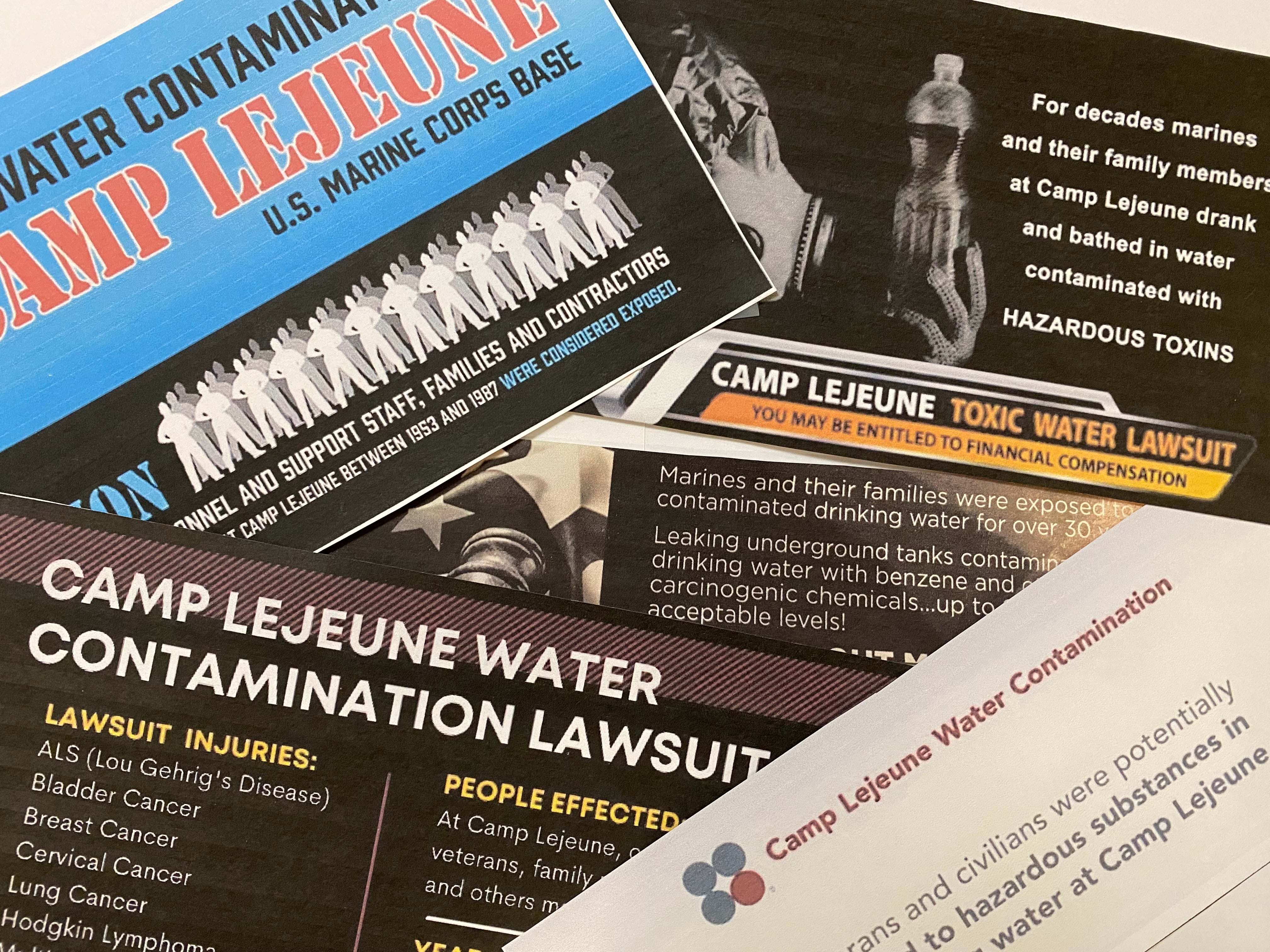The TV ads and colorful mailers have been relentless in recent months: “If you or someone you love served at Marine Corps Base Camp Lejeune prior to 1988, you may be eligible for financial compensation!”
But advocates are warning that tens of thousands of individuals who lived at the North Carolina base will never see a penny from a new law allowing civil suits against the military for water contamination injuries there.
And those who do get payouts probably won’t see any money for months or years.
Shane Liermann, deputy national legislative director at Disabled American Veterans, said, “Veterans need to make sure they’re well informed before they make any decisions about getting involved with these lawsuits, because it could actually cost them money.”
“The last thing we want is for our veterans to see a reduction in their benefits.”
RELATED

At issue is a provision in the recently passed Promise to Address Comprehensive Toxics Act, better known as the PACT Act.
The measure — signed into law on Aug. 10 — includes almost $300 billion in new financial benefits for veterans suffering from illnesses caused by burn pit smoke in Iraq and Afghanistan, Agent Orange spraying in Vietnam, and several other military toxic exposure events.
It also contains provisions dubbed the “Camp Lejeune Justice Act,” which allows civil suits against the government for injuries related to water contamination at the Marine Corps base from August 1953 to December 1987. More than one million individuals could be covered by the measure.
Well water contamination problems at the site have been documented for years.
In 2012, Congress passed legislation easing rules for veterans and their family members who developed rare cancers and other sicknesses to receive health care through the Department of Veterans Affairs.
But advocates have said that process doesn’t cover a host of problems or compensate families who already have lost loved ones to illnesses linked to the toxic water.
The new bill will allow them to sue for civil damages, providing a level of financial relief.
“This isn’t automatic payouts,” said Greg Rinckey, founding partner of the firm Tully Rinckey, which specializes in military law. “Individuals are going to have to file lawsuits to get those damages. But for the first time, they can take legal action to get monetary compensation.”
RELATED

Although passage of the PACT Act was not a certainty until earlier in August, law firms have been anticipating the Lejeune Justice Act would become law since early 2022, and marketing their services to potential would-be clients.
That has raised concerns from veterans advocates, who say many lawyers may be overselling the potential windfall.
Leadership at the Veterans of Foreign Wars in early August issued an explainer for veterans about the flood of legal advertisements, warning that “no one can tell you today exactly how VA will interpret the 150 pages of legislation until VA publishes regulations in the coming months.”
Among the unanswered questions is whether veterans who are eligible for disability payouts and VA health care may lose access to those benefits if they sue the government and win. Coupled with potential attorney fees, that could end up costing individuals more than they receive.
In a statement, Veterans Affairs officials said they will not penalize individuals by denying pending disability claims or cutting services simply for filing a lawsuit related to the Lejeune Justice Act.
But they noted that if a lawsuit is successful, “any award must be offset by the amounts of VA benefits provided in connection with health care or disability relating to exposure to the water at Camp Lejeune.”
Liermann said that is a significant concern.
“A lawsuit as a first step makes sense for some of these family members and relatives who aren’t getting any benefits now, because they have nothing to lose,” he said. “But for veterans who already get some help, there could be a dollar-for-dollar offset.”
Rinckey said that even successful lawsuits are likely to take months or years to complete. He estimates the first payouts from the new law likely won’t materialize until summer 2024 at the earliest, and only for the cases that are easiest to prove: severe injuries with no clear explanation but the poisoned water.
“In order to win these cases, people are going to have to prove not just that they were there, but that they were hurt,” he said. “More than one million people were exposed. But you have to also show injury in order to win the case.”
RELATED

That means that simply serving at Camp Lejeune, North Carolina, during the 25-year eligibility period isn’t enough to guarantee a cash settlement.
For now, veterans groups are urging veterans curious about the lawsuits to file a claim with VA first, to see if they’re eligible for medical care and benefits. That process can take months to complete, but does not carry with it outside lawyer fees.
Liermann said if that does not produce enough help, veterans can still file a lawsuit later, once the legal parameters and process have been more firmly established.
VA has not taken a formal stance on the rush of legal ads related to the water contamination issue, but said that individuals with related questions can contact accredited agents, which include veterans service organizations and other outside groups familiar with the benefits process.
More information on that is available at the VA web site.
Leo covers Congress, Veterans Affairs and the White House for Military Times. He has covered Washington, D.C. since 2004, focusing on military personnel and veterans policies. His work has earned numerous honors, including a 2009 Polk award, a 2010 National Headliner Award, the IAVA Leadership in Journalism award and the VFW News Media award.




